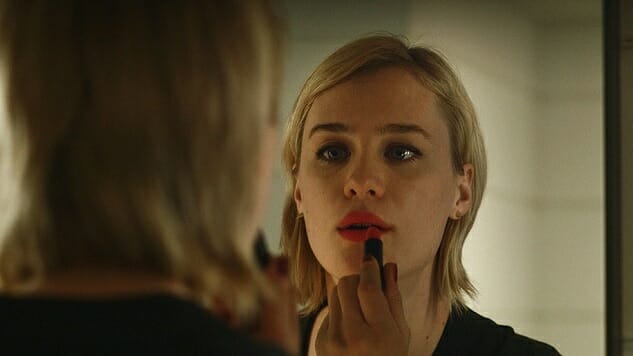Always Shine

Talking about the first and second acts of Sophia Takal’s Always Shine without talking about the third is a challenge. The film begins as a story of mounting personal and professional grievances between two friends and shifts into mindfuck territory just shy of half an hour before the ending credits scrawl. That pivot impacts the narrative immediately and drastically, giving us the sense that someone swapped reels and stuck us with a trippier, shorter Always Shine remake. But neither Takal nor writer Lawrence Michael Levine mean to mess with the audience just for the hell of it, because gimmickry for gimmickry’s sake is cheap and Always Shine has higher aspirations than deceptive schlockery.
The film is one part road trip movie, one part frenemy drama, and one part industry critique as sort-of chums Beth (Caitlin FitzGerald) and Anna (Mackenzie Davis) zip off to Big Sur to bond with each other after drifting apart for months. They’re both actresses, but Beth’s star is on the rise while Anna’s is stuck in neutral: People recognize Beth in public and pose for pictures with her, and Anna sits off to the side, ignored and invisible. Always Shine cleanly sets up this dichotomy in its first 10 or so minutes, introducing both women one at a time using neutral shot sequences where they talk straight into the camera before Takal cuts away to show us exactly who they’re talking with.
Beth is at a movie audition, and she’s talking to the highfalutin dudebros producing the picture. Anna, by contrast, is arguing with her mechanic for performing unauthorized maintenance on her car, which is like auditioning for her dignity. “Ma’am, there’s no need to raise your voice,” the prick tells Anna as she deflects his half-assed excuses for the oopsie, just before he doubles down on his mansplaining with naked misogyny: “If you were a touch more ladylike….” You half expect her to implode on the spot. It’s the first of several injustices dealt to Anna throughout the film’s duration, though the others each occur directly in relation with Beth, and these each cut deeper than routine sexism. Men like Beth. She’s attractive, she gives the appearance of innocence, she smiles habitually, and she’s quietly bubbly. Men don’t quite like Anna as much because she’s the exact opposite of these things, and to the guys she meets those qualities read as threatening.
-

-

-

-

-

-

-

-

-

-

-

-

-

-

-

-

-

-

-

-

-

-

-

-

-

-

-

-

-

-

-

-

-

-

-

-

-

-

-

-








































